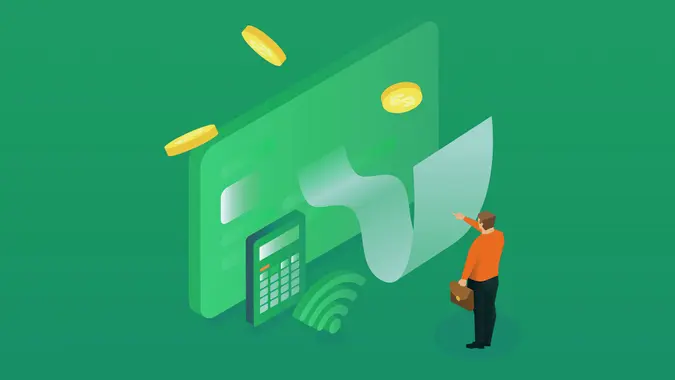Does an Overdraft Affect Your Credit Score? What You Need to Know

Commitment to Our Readers
GOBankingRates' editorial team is committed to bringing you unbiased reviews and information. We use data-driven methodologies to evaluate financial products and services - our reviews and ratings are not influenced by advertisers. You can read more about our editorial guidelines and our products and services review methodology.

20 Years
Helping You Live Richer

Reviewed
by Experts

Trusted by
Millions of Readers
No, over drafting your account won’t directly show up on your credit report. That’s because credit bureaus — like Experian, TransUnion and Equifax — don’t track your checking account behavior.
But (and this is important) there are a few indirect ways overdrafts can come back to bite you.
1. Unpaid Overdrafts That Go to Collections
If you leave your account overdrawn and don’t pay it or the overdraft fees back — your bank might eventually close your account and send the debt to a collections agency. At that point, it will show up on your credit report.
Collections can tank your score and stick around for up to seven years.
2. Using Overdraft Protection Tied to Credit
Many banks offer overdraft protection by linking a credit card or line of credit to your account. It’s helpful in emergencies, but since it involves borrowing, it can affect your credit.
Here’s how:
- It increases your credit utilization (how much credit you’re using vs. your limit)
- If you miss a payment, it may show up as a late payment on your credit report
3. Missed or Bounced Payments
If a payment bounces because of an overdraft — like your car loan or credit card bill — you could get hit with a late fee or worse. If the lender reports the missed payment to credit bureaus, your score takes a hit.
That’s why it’s crucial to make sure essential bills don’t fail to go through due to low funds.
How to Avoid Credit Problems from Overdrafts
Here’s a few tips to make sure an overdraft never affects your credit score:
1. Set Up Low Balance Alerts
Most banks and mobile apps let you get notified when your account drops below a certain amount. These alerts give you a heads-up so you can avoid going into the red.
2. Link a Backup Account
Connect your checking account to a savings account or credit card. If your checking runs dry, the bank can pull from the backup account automatically.
Things to know:
- Some banks charge a small fee for the transfer
- You’ll still need to repay the backup account or credit card
3. Pay It Back — Fast
If you do overdraft, pay it back as soon as possible. Many banks give you a grace period (often up to 30 days) but don’t wait. Repaying quickly helps avoid collections or account closures.
Even partial payments show the bank you’re making an effort.
4. Consider Turning Off Overdraft Coverage
If you’d rather not risk fees, you can opt out of overdraft protection altogether. That means:
- If you don’t have enough money, the transaction will be declined
- You won’t get charged an overdraft fee, but your purchase won’t go through
This option works well if you’re disciplined and prefer to avoid surprises.
Protect Your Credit From Overdraft Mistakes
So, does an overdraft affect your credit score? Not directly — but the ripple effects can. If an overdraft leads to missed bills, late payments or collections, your score can take a hit.
The good news? Most overdraft issues are fixable if you act fast. Set up alerts, know your bank’s policies, and always try to keep a little buffer in your account. Take a moment to compare bank accounts that offer overdraft protection that fits your lifestyle. Or check out our full guide to avoiding overdraft fees to stay ahead of the game.
FAQs: Does Overdraft Affect Credit?
Credit scores can be complicated. With that in mind, here are some common questions and concerns that come up while looking into how overdraft affects your credit score:- Does overdraft affect credit scores directly?
- Nope. Unless the overdraft leads to collections or missed payments, it stays off your credit report.
- Will overdraft fees lower my credit rating?
- Not by themselves. But ignore them for too long, and your bank could send the balance to collections, which does affect your credit.
- Can overdrafts go to collections?
- Yes. If your account stays negative and unpaid, your bank may close it and send the unpaid balance to collections.
- Does overdraft protection impact my credit score?
- It can if the protection pulls from a credit card or credit line. That’s borrowing -- and it affects your credit usage and payment history.
- How do I avoid overdraft-related credit trouble?
- Use alerts, link a backup account, pay overdrafts quickly and consider opting out of overdraft coverage if it doesn’t work for you.
Our in-house research team and on-site financial experts work together to create content that’s accurate, impartial, and up to date. We fact-check every single statistic, quote and fact using trusted primary resources to make sure the information we provide is correct. You can learn more about GOBankingRates’ processes and standards in our editorial policy.
 Written by
Written by  Edited by
Edited by 























